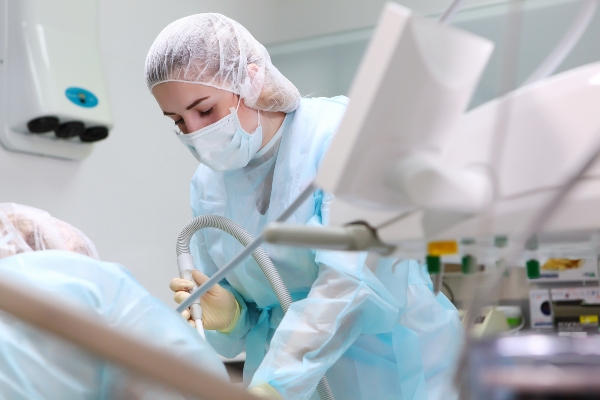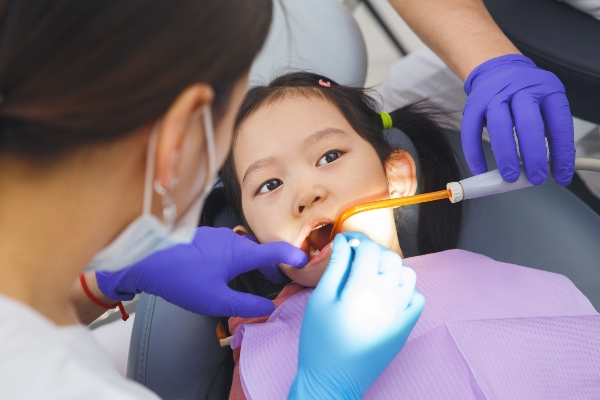What Procedures Can a Dentist for Kids Perform?

A dentist for kids focuses on ensuring the proper development of young mouths and teeth by educating patients and parents about preventative home hygiene practices, healthy eating habits, and steps for avoiding tooth decay and damage. In addition, the dentist performs a wide range of in-office procedures to prevent and treat childhood dental problems.
When should kids start visiting a dentist?
The American Academy of Pediatrics recommends that children start visiting a dentist around age 1 or within six months of a first tooth's eruption. Children who see a dentist as infants and toddlers see the following benefits:
- Reduced fear during future dental appointments
- Development of good oral hygiene habits
- Prevention of dental problems
What services does a dentist for kids offer?
Pediatric dentists can manage all aspects of children's oral health needs and perform various procedures to promote, maintain, and restore oral function.
Comprehensive exam and cleaning
A dentist examines infants' or toddlers' mouths for signs of tooth decay due to excessive exposure to milk, formula, or sugary beverages that feed oral bacteria. The dentist may educate parents about ways to protect young teeth, including not allowing children to sleep with bottles in their mouths or sharing utensils that could spread oral bacteria. In addition, dentists use X-rays to examine children's jaws, gums, bites, and oral tissue for signs of potential structural problems, tooth impactions, and decay.
Oral examinations for toddlers and older children include twice-yearly dental cleanings to remove plaque and tartar from primary teeth that could travel below the gum line, causing infection.
Fluoride treatments
Young dental patients who lack the agility and discipline to practice optimum oral home care consistently are susceptible to tooth decay. After completing a cleaning procedure, a dentist for kids may apply a thin fluoride layer over the teeth's protective outer enamel to create a barrier that discourages bacteria from penetrating the teeth.
Sealants
Sealants can fill in the crevices and uneven chewing surfaces of molars to prevent them from trapping decay-producing food particles. For example, a dentist for kids brushes a thin, plastic layer over the tooth, then shines a white light over it to ensure it hardens. This procedure prevents bacteria from compromising the enamel and reduces the risk of cavities due to indiscriminate childhood food choices.
Cavity fillers
Dental cavities are common among children through the adolescent years, and a dentist for kids can treat them using a procedure that relies upon amalgam or ceramic materials. The dentist first prepares the tooth by drilling away areas of decay before adding an appropriate filler that restores its structural integrity and function.
Crowns
Pediatric dental crowns support primary teeth susceptible to severe decay until permanent teeth erupt to replace them. Crowns usually consist of stainless steel, composite, acrylic, or porcelain fused to metal and facilitate chewing, which is necessary for the strength and development of the jawbone and surrounding muscles. Dentists also apply crowns to promote a healthy oral structure essential for a child's developing speech.
Space maintainers
Trauma and decay may result in the loss of a primary tooth before a permanent tooth replaces it. The premature loss of a tooth causes surrounding teeth to shift toward the space it leaves, crowding a permanent tooth when it is ready to erupt. As a result, permanent teeth misalign, making brushing and other oral maintenance efforts challenging. A dentist determines how to attach the space maintainer and if it will remain in place or be removable according to the location of the space.
Mouthguard fittings
A dentist may recommend a custom thermoplastic polymer mouthguard to cushion a child's teeth and oral tissue from damaging impact during sports activities. The dentist creates an impression of the child's bite and sends it to a lab where technicians make the mouthguard following the dentist's specifications to ensure a comfortable fit.
Extractions
Removing any natural tooth is typically a last resort when a dentist for kids cannot save it following a traumatic injury or severe decay. The procedure is also advisable to address overly retained primary teeth that loosen, then tighten back into the gums and cause adult teeth to misalign after emerging.
A dentist takes an X-ray to locate a tooth's roots to avoid damaging the surrounding bone during extraction. Finally, the dentist stitches the empty socket to prevent infection and installs a space maintainer to discourage shifting of the surrounding teeth.
Conclusion
A dentist for kids focuses on preventative and restorative procedures that can affect the health and development of young mouths. Parents can partner with a dentist to encourage children to understand the importance of following a rigorous oral health care regimen.
Request an appointment here: https://www.hvkidsmiles.com or call Hudson Valley Pediatric Dentistry at (845) 363-4177 for an appointment in our Middletown office.
Check out what others are saying about our dental services on Yelp: Dentist for Kids in Middletown, NY.
Recent Posts
A child dentist can help your child achieve better dental and general health. Regular visits allow your child to get used to dental checks, tools, and equipment. Dental fear disappears, and the young patient can continue having a bright, painless smile. Here are what parents like you should look forward to during child dentist appointments.Choosing…
Cavity treatment for kids is essential for a child’s oral health. Dental decay can cause discomfort, causing the child to lose focus at school. It can even result in low self-esteem and malnutrition. Treating cavities can improve your child’s general health. Here are effective techniques for cavity treatment for kids.There are cases when fillings cannot…
Parents play a crucial role in their children's tooth care by ensuring their children get started on the right path to optimal dental health. This involves overseeing children's tooth care at home while also helping them develop healthy dental habits and ensuring they see a pediatric dentist regularly.Parents will need to keep their child's mouth…
Just like adults, children need preventive dental care — that is where pediatric dentistry comes in. Many parents believe that their child's teeth are healthy simply because their child is young. The truth is that oral health issues are as prevalent in kids as much as adults. Since they love sugary treats, the risk of…


